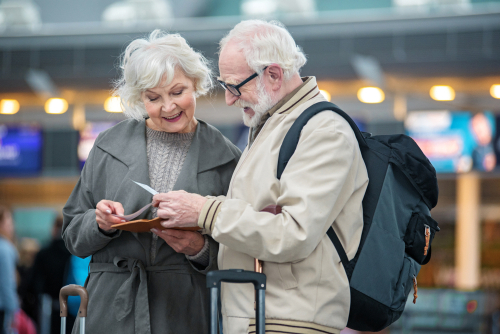6 Travel Tips for Seniors as Covid-19 Restrictions Ease
Category:

Whether it’s a bucket-list adventure or a staycation, we all want a happy, memorable trip! Now that travel restrictions are lifting, everyone is itching to get back out and travel again, especially older adults. According to AARP’s 2022 Travel Trends Report, 67% of people over 50 are planning to travel this year.
After the isolation of the past couple of years, planning a vacation can leave your elderly loved one feeling relaxed or even energized. However, travel restrictions or not, the planning process can still be a bit stressful. The good news is that with a little more research and preparation, senior travelers can feel confident about their itinerary while taking advantage of everything their vacation has to offer!
Ready to plan the trip of a lifetime? Below are six tips to make traveling for seniors go as smoothly as possible:
Coronavirus Precautions
Although we see the lowest travel restrictions since the start of the pandemic, COVID-19 may still affect your travel plans with new variants and rising cases in some destinations. Not only is it part of the traveling landscape, but the threat of getting severely ill with COVID-19 also increases with age and certain medical conditions.
All elderly adults should be fully vaccinated and boosted prior to travel, especially if they are immunocompromised. Make sure to research potential domestic and international travel restrictions in the designated area you’re planning to visit. Pack extra masks in your carry-on in case certain areas or businesses are still enforcing mask mandates. Properly pack away your vaccination card or take a picture of it on your phone to avoid the risk of losing it.
Visit the local destinations, choose outdoor activities, and try to avoid crowds. However, keeping a mask on hand is a great added precaution if you find yourself in enclosed spaces or crowded areas!
Medical Considerations
A primary care physician’s office can be the first destination for any senior traveler, especially those with physical or mental health conditions. Having a clean bill of health or any possible issues accounted for can put you or your older loved one at ease throughout a trip.
It is essential to keep a copy of your or your family member’s medical record and a list of their medications, supplements, and dosages. Bring medications in their original containers in a carry-on, especially for international destinations. Always pack extra medication in case of delays!
Plan Ahead
Although planning is key for traveling for any age, senior travelers must think through specific logistics for each day of their or their aging loved one’s trip.
When do you take medication? How active are you? Are there disabilities to consider? Is your lodging ADA-compliant? For international travelers, the U.S. State Department’s information for travelers with disabilities can help you navigate other countries’ accessibility laws. Arrive early for transport to your destination and build in extra time for getting ready, medications, travel, and sleep. Incorporating these into your planning provides a framework to build your schedule around the fun things on your trip.
That being said, flexibility is equally important, as traveling can present unpredictable delays and challenges! Accept that these obstacles are part of the adventure and create backup plans for when problems arise.
Transportation
Whether boat, plane, or truck, go the extra mile when planning your transportation!
- Road trips: for longer drives, consider booking a hotel room midway through and leave time to regroup once you arrive at your destination. Plan for restroom and stretching breaks every couple of hours.
- Flying: Try to purchase direct flights at a time of day when you or your loved one has energy and airports aren’t as busy. Some assistance requests may be available when booking. If assistance is required, try getting to the airport earlier than you usually would for staff to help with the extra accommodations.
- Cruise: If this is your first cruise trip, consider booking a shorter vacation and seeing how you like it. Trying a three or four-night cruise first is a great way to test the waters. If you enjoy it, a longer cruise may be in your future! Similar to flying, plan to get there early or take advantage of priority boarding if you booked your stay with accommodations for any disabilities.
Download Our Healthy Aging Diet Guide
Lodging
Wherever you stay, create a familiar environment by unpacking luggage, arranging items on the nightstand, and putting toiletries in the bathroom. If you and your older loved one are not sharing a hotel room, adjoining rooms could help you hear your loved one getting out of bed at night. This way, you have easy access to them, especially if they’re prone to falls or have cognitive impairment.
Have Fun!
While planning is important, don’t forget to pause and take in the scenery, culture, and excitement of your surroundings! Look into local events, landmarks, and iconic food destinations in your area to create the trip of a lifetime. Take photos, share laughs, and spend quality time with your loved ones!
Subscribe
Date: 2022-06-02
Category: